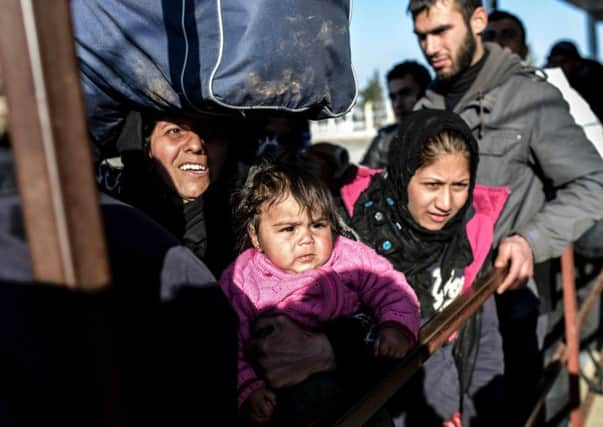Leaders: Migrant problem needs to be tackled at source


The desperate plight of the migrants currently seeking refuge in Europe is one of the great tragedies of today’s world.
It is only natural – and, indeed, absolutely necessary – that those in a more fortunate position should feel a strong obligation to help.
Advertisement
Hide AdAdvertisement
Hide AdTherefore Nato yesterday made its first intervention in the migrant crisis, announcing the deployment of ships to the Aegean sea in an attempt to deter people-smugglers taking migrants from Turkey to Greece.
The announcement, made at a defence ministers’ meeting in Brussels, was in response to the concerns set out by Turkey, Germany and Greece, who are growing increasingly alarmed by the scale of the crisis.
So far this year almost 75,000 migrants and refugees have arrived in Greece by sea. Of those, 45 per cent are said to be fleeing the upheaval in Syria. Horrifyingly, more than 400 of them have died attempting the sea crossing.
The initiative to send in ships led by Nato’s Standing Maritime Group 2 – a five-strong fleet which is under German command – is undoubtedly well-intentioned.
Nato Secretary-General Jens Stoltenberg described it as an attempt to “manage a human tragedy in a better way than we have managed to do so far”.
Unfortunately its wisdom is more questionable. With the warships expected to begin their mission in a matter or hours, Mr Stoltenberg said their intention was not to stop or push back refugee boats. Rather, the mission was about building up “critical information and surveillance” to counter human trafficking and criminal networks.
Just how fruitful this proves to be remains to be seen, but it is difficult to see how it can succeed.
Sending a handful of ships into the Aegean Sea is likely to be of limited value. The ruthless people smugglers simply will not care and will still be prepared to risk everything in pursuit of their grisly trade.
Advertisement
Hide AdAdvertisement
Hide AdThe unfortunate migrants and refugees already face enormous risks from the crossing. Their desperation is such that they may think the possibility of being picked up by a friendly Nato boat gives them an incentive to take to the sea.
The chance of a Nato ship actually coming across migrant boats seems remote and will only affect a small proportion of those embarking on the perilous journey.
The only way of effectively tackling this problem is to start at its root. The Russian airstrikes bombarding Syria succeed in forcing tens of thousands more people to flee their homeland and seek safety elsewhere.
The only long-term solution is to make Syria a safe place to live again. That can only be done by ending the conflict and ejecting IS.
Diplomatic efforts to do this may have faltered in the past, but they remain the best way forward. They cannot be allowed to cease and more effort must be invested in seeking a diplomatic solution. The human cost of failure is too severe to calculate.
Celebrating scientific endeavour
In the hustle-bustle of everyday existence, it is all too easy to lose sight of the bigger picture.
Great scientific breakthroughs can seem secondary to more immediate concerns brought about by the economic, political and social crises of our time.
The observation by the Ligo Collaboration of the warping of space-time generated by the collision of two black holes more than a billion light years from Earth deserves recognition beyond the scientific community.
Advertisement
Hide AdAdvertisement
Hide AdHailed as an enormous breakthrough in man’s attempts to fully understand gravity, its significance is only matched by its complexity.
The ceaseless striving by some of the world’s most brilliant minds to more fully understand the universe we inhabit is a noble quest.
In its own way, yesterday’s breakthrough was comparable to a certain apple falling on the head of Sir Isaac Newton.
It is a discovery that follows in a long and distinguished line that runs from the ancient world and includes the likes of Copernicus and Galileo.
Across the ages, the remarkable march of human progress has been driven by the endeavour, curiosity and intelligence of some truly outstanding individuals and teams.
By increasing our understanding of life and our surroundings, men and women of science have made an enormous contribution to society. It is a contribution that has improved our lives in ways that are too numerous to mention.
It is at times like these that we would do well to lift ourselves above the mundane and recognise their achievements, even if often we can’t pretend to fully understand them.